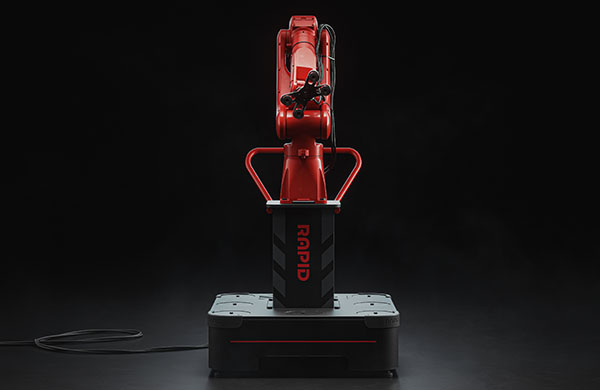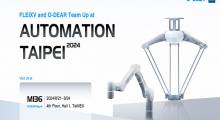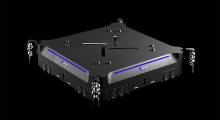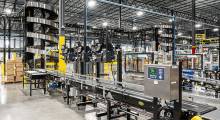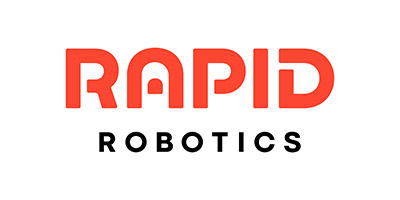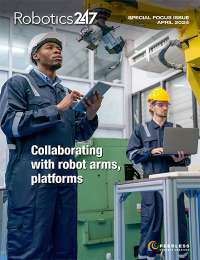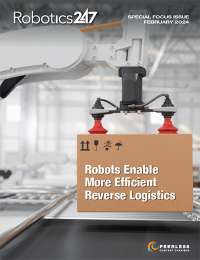Rapid Robotics yesterday announced that it is integrating its Rapid Machine Operator with industrial automation from Yaskawa America Inc.'s Motoman Robotics Division. The San Francisco-based company added that its technology is now integrated with Yaskawa's entire robotics portfolio, delivering more speed, higher payload, and increased performance to North American manufacturers.
“Since our founding in 2019, Rapid Robotics has been committed to providing manufacturers with a holistic workforce solution in the form of accessible, low-risk automation,” stated Jordan Kretchmer, co-founder and CEO of Rapid Robotics. “Today, we’re able to deliver on that commitment better than ever through our partnership with Yaskawa Motoman and their legacy of industrial expertise.”
Rapid Robotics claimed that its robotics-as-a-service (RaaS) offering eliminates complexity and is equivalent to labor at $6 to $16 per hour. The robots can perform up to 80% of common machine operator tasks in a matter of weeks and deliver a return on investment (ROI) as soon as they start producing parts, the company said.
Rapid Robotics’ investors include Tiger Global, Kleiner Perkins, NEA, Greycroft, Bee Partners, and 468 Capital.
Rapid Robotics says RMO to democratize automation
Historically, industrial automation be more challenging and time-consuming to deploy than collaborative robots, noted Rapid Robotics. This is especially true outside of mass production environments because of their complexity and the extensive safety measures required, it said.
The Rapid Machine Operator (RMO) offers the flexibility of a cobot while meeting all mandatory safety measures with the added payload, speed, and reach of a traditional industrial arm, said Rapid Robotics. The modular approach of the new RMO and streamlined Yaskawa industrial robots allow for “unprecedented” speed of deployment, the company said.
“By combining advanced computer vision, artificial intelligence, and instinctive learning with as-a-service characteristics including cloud connectivity, monthly leasing, and 24/7 support, Rapid Robotics has been able to democratize automation in the face of an intense workforce shortage,” said Rapid Robotics.
“Now, with the Yaskawa portfolio as an integrated part of Rapid Robotics’ suite of solutions, manufacturers needing an industrial-size solution who previously could not automate due to traditional barriers like cost, inflexibility, or lengthy deployments can make those automation dreams a reality,” it said.
Yaskawa promises ease of integration
The Yaskawa robots have robust capabilities, avoid interference with peripheral devices, and minimize the space needed to install an RMO work cell, said the company. A key feature of this re-imagined work cell is an innovative mobile robot pedestal with modular fixturing.
The mobile pedestal gives this light industrial arm the same flexibility as Rapid Robotics’ cobots, because it can be easily moved or reconfigured and then re-locked into place by a single person.
“A trusted name in industrial automation for over 100 years, Yaskawa is an established leader in the robotics market,” said Chris Caldwell, a product manager at Yaskawa Motoman. “A partnership with Rapid Robotics opens the door to automation for a large number of enterprises that have previously found it difficult or intimidating to deploy robotic solutions.”
“Yaskawa is excited for the opportunity to offer truly industrial solutions, expanding Rapid Robotics’ capabilities while providing improved cycle times and return on investment for end users,” he said. “By combining strengths, Rapid Robotics’ advanced vision systems and state-of-the-art AI allow Yaskawa’s full line of robotic manipulators to shift repetitive or dangerous tasks away from your human workforce, freeing them to perform more fulfilling work.”
Founded in 1989, Yaskawa Motoman said more than 500,000 Motoman of its robots have installed globally. The company provides systems for applications including arc welding, assembly, coating, dispensing, material handling, material cutting, material removal, packaging, palletizing, spot welding, and clinical laboratory specimen processing.
Rapid Robotics also works with Universal Robots
Rapid Robotics last week announced that Universal Robots A/S will supply collaborative robots for Rapid's deployment of workcells across North America. The companies said this will enable them to serve more customers and maintain the rapid deployment times they've come to expect, even as Rapid Robotics expands its U.S. footprint.
“As the number of unfilled, critical manufacturing roles increases and global economic uncertainty continues to impact supply chains, more and more North American manufacturers are turning to automation,” said Kretchmer. “This collaboration with UR helps us deploy more cobots, with a wider variety of capabilities, at a faster rate, ultimately helping manufacturers of all shapes and sizes manage and even thrive through the adversity they are facing.”
Rapid Robotics said it can deploy any cobot from the UR product portfolio, expanding capabilities for palletizing, box building and packing, and operations requiring a heavier payload or longer reach. The partners said they will offer greater flexibility in the design of work cells and selection of peripheral equipment, as well as faster cobot deployments.
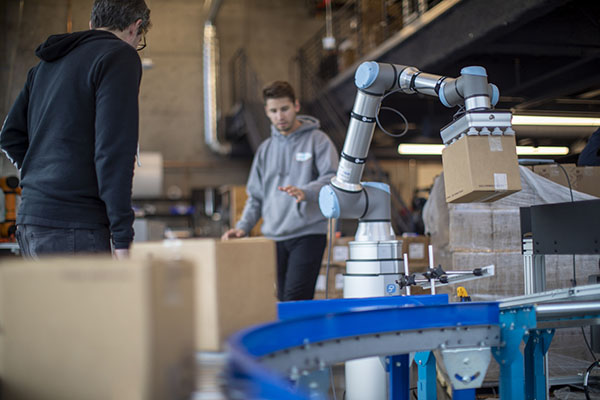
Universal Robots claimed that its two-week ship program is one of the fastest in the industry. Rapid Robotics added that its AI, advanced vision systems, and unique software stack allow robots to run in customer facilities in a matter of weeks versus the typical months to years.
“Universal Robots has spent the last decade in North America focused on freeing up more manpower by automating a wide range of human-scale tasks with easy-to-deploy cobots,” said Bryan Bird, regional sales president at Universal Robots. “We’re excited to work with Rapid Robotics in a partnership that will enable us to break down more automation barriers, deploying a robotic workforce to address those jobs manufacturers simply can’t staff.”
Since introducing its first commercial cobot in 2008, Universal Robot has developed its robot arm portfolio, as well as support from a wide range of end effectors, software, accessories, and application kits in the UR+ ecosystem. The Odense, Denmark-based company said it has installed more than 50,000 collaborative robots worldwide and recently reported record revenue of $326 million (U.S.) in 2022.
Article topics
Email Sign Up

